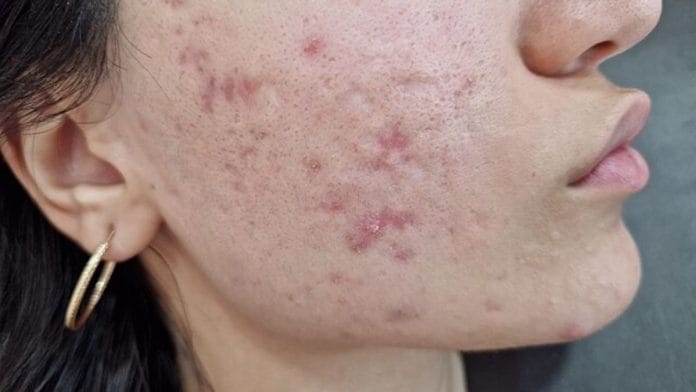One in every five Indian women today has PCOS. And it’s PCOS, not PCOD—it stands for polycystic ovary syndrome, which is not a disease. The condition comes with hormonal imbalance, acne, unwanted hair growth, and makes you truly wonder if you’re part wolf.
PCOS doesn’t discriminate, nor does it play fair. But that doesn’t mean you can’t take control of your hair and skin.
But before you can do that, you should know how PCOS affects your hair and skin.
To put it simply, PCOS is your hormones throwing a rager that never seems to end, with your hair and skin as the unfortunate victims. It involves higher levels of androgens, which are hormones regulating muscle growth, bone density, and hair growth. They’re sometimes called “male hormones” because they’re usually present in higher levels in men.
Because of excess androgens, you’ll be dealing with:
- Deep, annoying, and painful nodulocystic acne
- Hair growth on the chin, upper lip, areola, and belly button
- Thinning hair and female pattern baldness
- Skin darkening and dark patches
So what should you do differently?
Skincare with PCOS
If you have PCOS, you’re not just dealing with occasionally oily or sensitive skin; it’s all that and more. This is precisely why a regular skincare routine might not cut it for you. Here’s what you should do instead:
1. Acne
Acne usually responds better to surface-level applications of salicylic acid or benzoyl peroxide. But PCOS acne is deeper, more rooted, cystic, and quite stubborn.
Here’s what you’ll need:
- Retinoids (prescription or OTC adapalene) to increase the speed at which your skin cells turn over
- Niacinamide to help your skin control its oil (production?) without irritation
2. Hair removal
For those not bogged down with PCOS, waxing and shaving work just fine as hair removal techniques.
However, if you have PCOS, then you’re dealing with thicker, darker hair, which means more ingrown hair situations and subsequent irritation after shaving.
Here’s what you should try:
- Laser hair reduction, a long–term fix that is worth investing in
- Electrolysis for particularly stubborn spots
Avoid frequent waxing, as it can lead to hyperpigmentation.
3. Tanning and hyperpigmentation
If you have PCOS, your tans are going to stick around like a bad ex. But there’s no cause for alarm.
You can fix PCOS hyperpigmentation with:
- Vitamin C serums, which brighten dark spots
- Chemical exfoliants like AHAs/BHAs, which even out skin tone
- Sunscreen (Applying SPF 50+ every day is absolutely non-negotiable.)
Also read: Don’t scratch mosquito bites. Here is how to deal with itching, redness
Hair care with PCOS
This goes without saying, but PCOS–related hair loss is not even close to regular hair thinning. This is because androgens shrink hair follicles, which eventually leads to hair thinning at the crown of your head and forehead. Somewhat paradoxically, PCOS also causes another condition called hirsutism: the growth of excess body hair.
Dealing with these changes is often anxiety-inducing, and it causes endless frustration. After consulting with your trusted dermatologist, here’s what you should do:
- Try using minoxidil or Rogaine to stimulate hair growth
- Make sure your vitamin D and Iron counts are at the optimum levels
- Avoid tight hairstyles and buns and extreme heat exposure
- Never use anything sulphate-based for your hair
Also read: Your lips need SPF too. There’s a risk of long-term damage
The extra mile
Beyond the medications you might be on for PCOS, you also need to do your bit to give your body a fighting chance.
1. Diet
- Say no to all sugars and processed carbohydrates, which spike your insulin levels and aggravate PCOS
- Include more protein and omega-3 fatty acids as they will help lower inflammation
- Drink spearmint tea to lower androgen levels
2. Exercise
- Do cardio and strength training to balance your insulin and reproductive hormones
- Try yoga or pilates to reduce your cortisol levels
3. Supplements
After consulting with your dermatologist, here are some supplement options you could consider:
- Myo-inositol and D-chiro-inositol, the game changers in terms of insulin resistance
- Vitamin D3
- Zinc and magnesium, which help lower stress and acne
PCOS makes one realise how deep-rooted certain issues can be—a regular skincare routine doesn’t cut it. You need a more holistic approach that covers all bases.
The key thing to remember is being patient: hormones don’t correct themselves overnight.
Dr Deepali Bhardwaj is a Consultant Dermatologist, Max Hospital, Saket. She is also an anti-allergy specialist, laser surgeon and internationally trained aesthetician. She tweets @dermatdoc. Views are personal.
(Edited by Prasanna Bachchhav)






